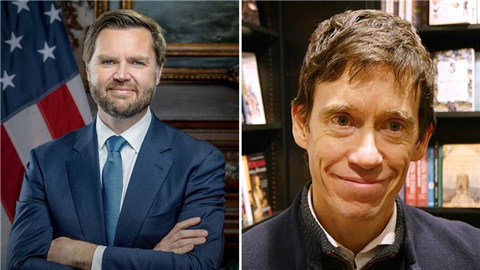A spat between the sitting US Vice President and a former Tory MP has generated a huge amount of debate online. What is ordo amoris, why does it matter and how should Christians respond?

Most Christians would agree that one of the key challenges Jesus offered to his followers was to see beyond tribal boundaries.
The Kingdom of Heaven, which will contain people “from every tribe and tongue and nation” (Revelation 7:9), ultimately transcends all the divisions between groups of people that exist on this side of eternity. Jesus insists that we love our enemies. He tells the parable of the Good Samaritan, one lesson of which is that our true neighbour might be a member of a different, despised nation.
So there was a good deal of hostile reaction to US Vice-President JD Vance last week. In an interview with Fox News, he stated “there’s this old school concept – and I think it’s a very Christian concept, by the way – that you love your family, and then you love your neighbour, and then you love your community. And then you love your fellow citizens in your own country, and then after that you can focus and prioritise the rest of the world.”
Former Tory MP Rory Stewart was among those who criticised Vance, suggesting that his words went against the grain of the imperative to love one another. He thought the idea more “pagan” than Christian.
A bizarre take on John 15:12-13 - less Christian and more pagan tribal. We should start worrying when politicians become theologians, assume to speak for Jesus, and tell us in which order to love… https://t.co/rrsivzGdvT
— Rory Stewart (@RoryStewartUK) January 30, 2025
Vance fired back with a reference to the “ordo amoris”; a Latin phrase which literally means “the order of loves”.
Just google “ordo amoris.” Aside from that, the idea that there isn’t a hierarchy of obligations violates basic common sense. Does Rory really think his moral duties to his own children are the same as his duties to a stranger who lives thousands of miles away? Does anyone? https://t.co/otvv5g1wFN
— JD Vance (@JDVance) January 30, 2025
Vance is talking about attempts by theologians such as Augustine of Hippo (354-430) and Thomas Aquinas (1225-74) to work through how Christians should fulfil their responsibilities to the rest of humanity, balancing our immediate and natural duties to those in close proximity, with the need to avoid excluding strangers and those in need further away.
Such questions were complex enough in Augustine and Thomas’ times; in our own era, when technology gives us much more knowledge of the world and its needs, and where modern sophisticated economies have created abundance that might be shared with less fortunate places, they are extremely difficult.
Those who lean towards the Vance view might argue that for most people, acting well in our immediate context, and doing practical good for the people we encounter – our families or the unemployed member of our church or the homeless man in the town centre – is the most normal and obvious way in which they can develop Christian virtues. God has placed us in certain places, to grow in holiness in particular ways. GK Chesterton put it this way: “We have to love our neighbour because he is there…He is the sample of humanity which is actually given us. Precisely because he may be anybody he is everybody.” Furthermore, Paul stresses the special responsibility of the local church and its members to support one another. In 1 Timothy 5:8, he states that “if anyone does not provide for his own, and especially for those of his household, he has denied the faith and is worse than an unbeliever.” The Ten Commandments instruct us to “honour our father and mother” (Exodus 20:12), which only makes sense if we are to give our parents some special honour that we do not give to others. And of course, breezy talk about global justice as an abstraction can mean failing to do what needs doing at the small scale. As the old saying goes, “everyone wants to save the rainforest, and no-one wants to do the washing-up”.
But this is not the whole story. Critics of Vance would note – rightly – that for Christians in wealthier countries, we have been given some stark warnings about ignoring the plight of the poor. The story of the rich man and Lazarus, and the parable of the sheep and the goats, both make it clear what is expected of those who have been blessed with abundance. Jesus words, “whatever you did for one of the least of these brothers and sisters of mine, you did for me” (Matthew 25:40) are a challenge to comfortable Westerners. A full reckoning with our responsibilities in this area must include not only our countrymen, but also the poor of other countries, whom we must regard as our neighbours insofar as we can help them. Each of us who lives comfortably, with more than enough for our basic needs, must consider how comfortably we ought to live when many people do not have anywhere near enough.
Another layer of complexity comes from the difference between requirements for Christian individuals, and the obligations borne by our rulers. Who and what should we vote for and advocate to help people most effectively? How do we strike the balance between charitable giving and economic reform to help other nations stand on their own two feet?
To further complicate matters, duties laid on us as individuals do not always scale up neatly. Does the command to turn the other cheek when we are wronged require the abolition of the criminal justice system? Can the voluntary communal living described in Acts form a template for governments to impose a communist system on an entire society?
Over the weekend, as the JD Vance vs Rory Stewart debate went viral, all kinds of commentators were chipping in - many who (unlike both Vance and Stewart) do not claim in any way to be Christians. I confess to not being very interested in opinions about complex theological-political problems that have been debated for 2000 years, from people who don’t darken the doors of a church from one year to the next and couldn’t tell me what continent St Augustine of Hippo lived on without looking it up.
Much of the commentary seemed to boil down to, “Jesus said we should love everyone, I think you’ll find that this resolves all questions about nationality, government and moral responsibility without any need for further reflection.”
The issues raised by Vance are worthy of serious and informed theological debate. This is not a simple issue that can be waved away by either side. Instead, we should give these concepts the careful, prayerful attention they deserve.



































3 Readers' comments